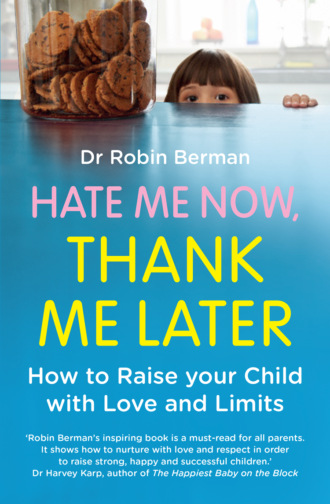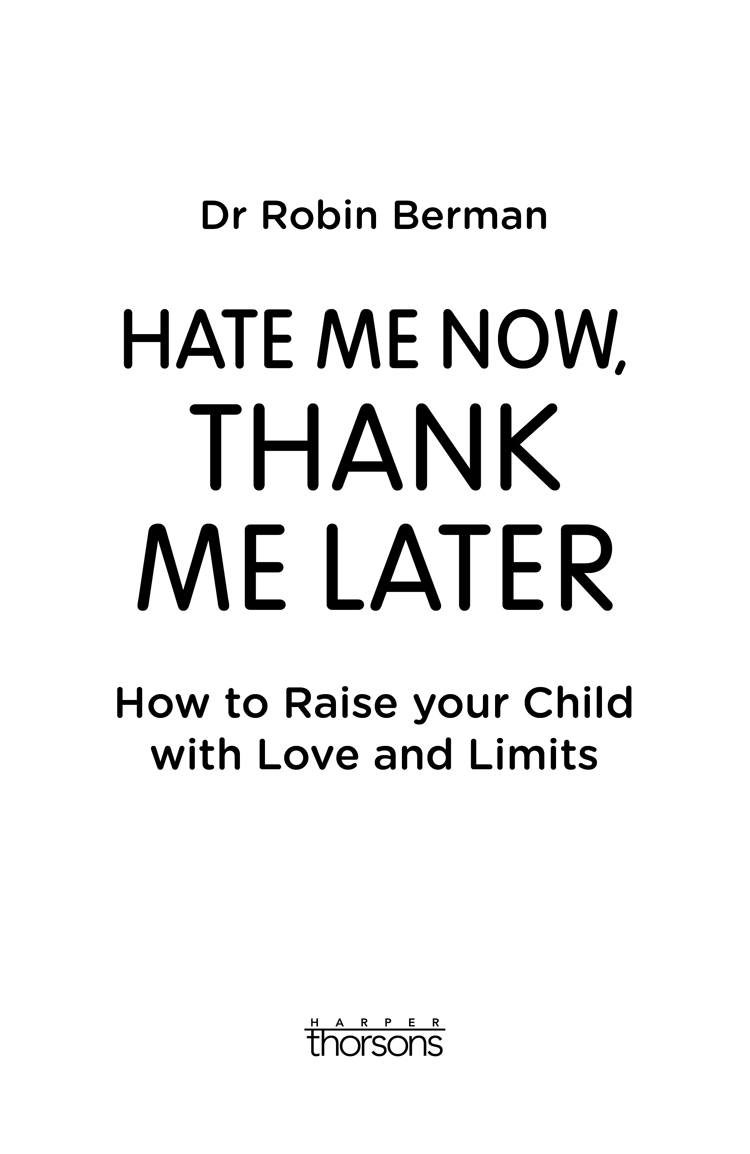
Полная версия
Hate Me Now, Thank Me Later: How to raise your kid with love and limits


Hate Me Now, Thank Me Later is rich with wisdom, and it is filled with laughter and heart-warming moments that any parent can recognize. This book is a powerful inspiration to rise to the challenge of being the best parent possible, and it gives gentle guidance for getting there. Robin Berman has written the how-to for being the parent we all wish to be.”
MARIANNE WILLIAMSON, New York Times bestselling author of A Return to Love
“Robin Berman shares how parents can look deep within, so that they can keep their own childhood drama in check and lead from a position of strength, wisdom, and love. All parents will find themselves in the pages of Dr. Berman’s book.”
DR. CATHERINE BIRNDORF, Mental Health columnist for Self Magazine and author of The Nine Rooms of Happiness
“Dr. Berman’s exceptional book is a gift to parents who long to raise their children in a wise, heart-centred way by discovering and cultivating the uniqueness of each child’s individual spirit.”
MICHAEL BERNARD BECKWITH, author of Life Visioning
“Dr. Berman brilliantly and compassionately serves from the heart when guiding parents to do the most important work of their lives. She and this book are gifts to you and your family today and for generations to come.”
JAMES ROUSE, naturopathic doctor, author and TV personality on Optimum Wellness
“Dr. Berman’s thoughtful book sheds light on how to establish a trusting, loving and nurturing relationship with one’s children, so that they will develop confidence, inner peace, and be ever ready to meet life’s challenges.”
VIVIEN K. BURT, Director of The Women’s Life Centre at the Resnick Neuropsychiatric Hospital at UCLA
To my wonderful husband, whose support for this book and support in my life are immeasurable.
To my beloved children, who raise me up.
My heart overflows with love for all of you.
Contents
Cover
Title Page
Praise
Dedication
Introduction
Chapter One Hate Me Now, Thank Me Later
Chapter Two The Strength of the Bond
Chapter Three Look, No Hands!
Chapter Four Being an Emotional Grown-up
Chapter Five Trash the Trash Talk
Chapter Six Prada Kids
Chapter Seven Moderating Media
Chapter Eight Life Is Remembered in the Pauses
Chapter Nine Love’s Lasting Legacy
Chapter Ten Out of the Mouths of Babes
Acknowledgments
About the Author
Copyright
About the Publisher
Introduction
Many people spend their whole lives yearning for the loving, nurturing parents they never had. As a psychiatrist, I often feel sad when patients tearfully retell stories of what went wrong in their childhood and how deeply those moments still affect their lives. So many times I wish I could wave a magic wand, go back in time, and change those moments—before their impact becomes incorporated into who people are, how they see themselves, and how they relate to the world.
I would love this book to be your magic wand—a tool you can use to become the mother or father your children yearn for.
I love children. I always have. I babysat, was a camp counselor, was a substitute teacher, and I went to medical school to become a pediatrician or a child psychiatrist. But when I realized that healthy kids generally come from healthy parents, that’s when I found my calling.
If we pay more attention to the way we parent, we can save our children so much future pain. Think of how you would have been spared if your parents were more conscious and sensitive to your needs. That is my sole intention for writing this book, to inspire parents to be their best selves, so they can be the best parents possible. I believe in preventive medicine. This book is about preventive parenting. It is my deepest wish that, in writing this, I can help someone to have a more meaningful and loving relationship with their child.
I was never a fan of old-school parenting, when children were seen and not heard, punishment was swift and corporal, hitting was the norm, and fear and shame were ways of controlling kids’ behavior. Trust me, I hear stories daily of adults who were scared of their parents or fed a diet of shame. I can promise you that this is not the recipe for self-esteem.
Then this generation of children who felt neglected grew up and wanted to be more attentive than their parents had been. These new parents began to read books, go to lectures, and adopt new philosophies. Many were focused on how to foster self-esteem in their children.
I love that instinct. But, as in a game of telephone, how to actually do that got lost in translation.
Somehow children went from being seen and not heard to being the center of the universe. The whole family hierarchy collapsed, leaving children in charge, bossing their parents around. Somehow giving children self-esteem was construed to mean giving them a trophy for showing up, hovering over their every move, pouring on excessive praise, and never saying no, for fear of hurting their feelings.
In trying to constantly please our children and make them happy, we have done just the opposite. This pendulum swing has created a whole new breed of entitled, fragile kids.
The self-esteem movement backfired out of a giant misunderstanding of how real self-esteem is attained. Parents have focused too much on résumés over learning, competition over connection.
In this fast-paced culture, we have lost our perspective, our equilibrium, our internal peace. It is very difficult to offer something to our children that we ourselves don’t have. The pendulum has swung too far. Children went from being neglected to being hypermanaged, while kids’ real, deeper needs still remain unmet. Out of the best of intentions, we have left children too vulnerable to stress. Rates of anxiety, depression, drug use, and suicide in kids continue to rise. And I feel called to help.
Isn’t there a graceful place in the middle of these parenting extremes? A hybrid approach in which we thoughtfully reflect upon what we should keep from our parents’ methods, what we can learn from recent parenting trends, and what no longer serves us?
• For instance, parenting in the past was all about respecting parents; today it has become all about respecting children. How about we try mutual respect?
• Kids used to be scared of their parents; now parents are being emotionally bullied by their kids. How about setting loving limits, with you squarely at the helm?
• “You should be ashamed of yourself” was a common, damaging mantra; now we’re “good job”-ing our kids to death. Let’s give accurate, specific praise where it is due and delete shame from our vocabulary.
With all the activities we run kids to and from, and all the expectations we have of them and ourselves, family time is getting squeezed out. Parenting seems more like a profession than a relationship. But it is a relationship. A profoundly meaningful one. How we are treated as children informs much of our self-understanding. Childhood is the template for how kids learn to love and trust. It is a story that becomes deeply embedded in the fabric of our being. A strong bond with your parents builds emotional security, which allows you to be at home with yourself and to make your way in the world.
That’s why I wanted to write a book about building that bond. I could write solely from my own experience—as a mother, a psychiatrist, and a parenting group leader. But I wanted to cast a broader net that captured the untapped, collective wisdom of revered teachers, respected coaches, cherished parents, beloved pediatricians, insightful therapists—and kids themselves. If we look at the commonalities from all of these sources, we find a soulful and commonsense perspective that is much simpler than we try to make it.
This book is a collection of pooled wisdom. I’m offering you my parenting Rolodex—including the people I turn to for parental inspiration—because no one should have to do this alone. It’s too big a job. You’re not going to get it right every time. No one does. Even if you know the right thing to do, in the heat of the moment, it’s easy to react reflexively.
Sometimes we’re just brought to our knees by parenting. We care so much, love so deeply, and want so badly to get it right. So I offer you this parenting village, this tapestry of experience. Take what you want, whatever resonates with you, whatever supports you, and throw the rest away.
Interviews for this book were captured by pen and paper. I scribbled quickly as wisdom poured out of these wonderful people. I did not catch every word, nor did I fact-check their stories. I tried to capture the gist of what they shared. Many stories are presented intact. In most of the anecdotes, some identifying information has been changed. A few stories are composites that took place over days or years, and were sewn together to illustrate a point more gracefully, all in the service of giving you the clearest distillation of what people had to share. Some of these stories are my own, some are from my patients, some I read about, some I heard, and others I observed.
I have learned so much from writing this book. Topping the list would be that parenting is more about raising yourself than it is about raising your child. What a great gift our children give us, if we let them: the opportunity to grow ourselves. Only then can we give our children the parents we want to be.
When you parent from your highest self, you can be of the greatest service to your children.
Конец ознакомительного фрагмента.
Текст предоставлен ООО «ЛитРес».
Прочитайте эту книгу целиком, купив полную легальную версию на ЛитРес.
Безопасно оплатить книгу можно банковской картой Visa, MasterCard, Maestro, со счета мобильного телефона, с платежного терминала, в салоне МТС или Связной, через PayPal, WebMoney, Яндекс.Деньги, QIWI Кошелек, бонусными картами или другим удобным Вам способом.


